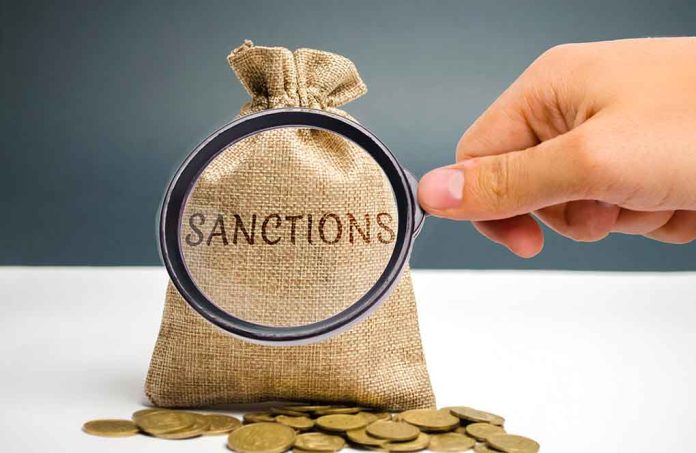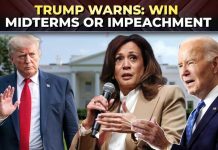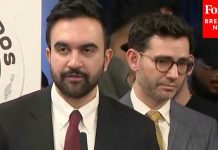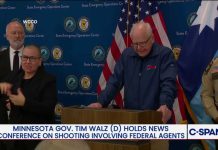
Ukrainian President Volodymyr Zelenskyy pleads with President Trump to unleash powerful sanctions on Russia after Moscow rejected even a brief 30-day ceasefire proposal, exposing Putin’s reluctance to engage in meaningful peace negotiations.
Key Takeaways
- President Zelenskyy has urged President Trump to impose a “strong new package” of sanctions against Russia if upcoming peace talks in Istanbul fail to produce results
- Russia has rejected Ukraine’s proposal for a 30-day ceasefire, instead offering only a “game of rhetoric” with a limited 2-3 day partial pause in fighting
- Zelenskyy specifically called for sanctions targeting Russian energy, oil tankers, banks and the financial sector to apply maximum pressure
- President Trump has indicated the U.S. will soon assess Putin’s seriousness about ending the war but has withheld new sanctions pending peace negotiations
- Zelenskyy emphasized that Russia should not have veto power over NATO decisions, maintaining Ukraine’s sovereignty in international relations
Zelenskyy Calls for Trump’s Direct Intervention
In a significant diplomatic appeal, Ukrainian President Volodymyr Zelenskyy has directly called on President Donald Trump to implement severe sanctions against Russia if upcoming peace negotiations in Istanbul fail to yield progress. Speaking at a summit of the Bucharest Nine and Nordic leaders in Vilnius, Zelenskyy emphasized that Russia’s rejection of a proposed 30-day ceasefire demonstrates Moscow’s unwillingness to engage meaningfully in peace efforts. The Ukrainian leader’s urgent request comes as delegations from both nations prepare for another round of talks aimed at ending the protracted conflict.
“If the Istanbul meeting brings nothing, that clearly means strong new sanctions are urgently needed — from the EU’s 18th package, and from the United States specifically, the strongest sanctions President Trump promised,” said Zelenskyy, President of Ukraine.
Trump’s Measured Approach to Russian Sanctions
President Trump has maintained a strategic position, withholding new sanctions while assessing the sincerity of Russian peace overtures. This approach reflects his commitment to achieving a lasting resolution to the conflict while maintaining leverage. The administration has signaled its readiness to act decisively if Russia proves unwilling to negotiate in good faith. Trump’s administration is reportedly prepared to implement comprehensive sanctions targeting key Russian economic sectors should peace talks fail, but is carefully avoiding actions that might derail potential diplomatic breakthroughs.
“If I think I’m close to getting a deal, I don’t want to screw it up by doing that,” said Trump, President of the United States.
Zelenskyy has specifically requested sanctions targeting Russia’s energy sector, oil tankers, banks, and broader financial systems – areas that would apply maximum pressure on Moscow’s economy. These targeted measures are designed to significantly impact Russia’s ability to finance its military operations while compelling its leadership to reconsider their position. The Ukrainian proposal includes not only a ceasefire but also the return of deported Ukrainian children, highlighting the humanitarian dimensions of the conflict that sanctions could help address.
Resistance to Russian Demands and NATO’s Role
A major point of contention in the peace process remains Russia’s demand for Ukraine to halt receiving Western military support – a condition Zelenskyy has firmly rejected. The Ukrainian president has also emphasized the importance of maintaining Ukraine’s sovereignty in international relations, particularly regarding NATO. During the Vilnius summit, Zelenskyy articulated a clear position against allowing Russia to dictate Ukraine’s relationships with Western security structures, reflecting his commitment to preserving his nation’s independence despite ongoing military pressure.
“One of the key principles of European security is that Russia must not have veto power over NATO decisions or influence over the allies or its members,” said Zelenskyy, President of Ukraine.
Prospects for Peace Negotiations
Observers remain skeptical about the potential for a breakthrough in the upcoming Istanbul peace talks. Russia has yet to submit a formal memorandum outlining its position, while continuing to make maximalist demands that Ukraine finds unacceptable. Zelenskyy’s criticism of Russia’s offer of a limited 2-3 day partial ceasefire as merely a “game of rhetoric” highlights the significant gap between the positions of the two sides. This diplomatic impasse underscores the importance of economic pressure through sanctions as a tool to alter Russian calculations.
The upcoming NATO summit is expected to deliver a strong message of unity and resolve in supporting Ukraine, reflecting the alliance’s commitment to European security principles. Zelenskyy’s engagement with regional leaders at the Bucharest Nine and Nordic summit demonstrates Ukraine’s continued diplomatic efforts to maintain international support. As peace talks proceed, the role of American leadership and potential sanctions remains a crucial factor in determining whether meaningful progress toward ending the conflict can be achieved.













